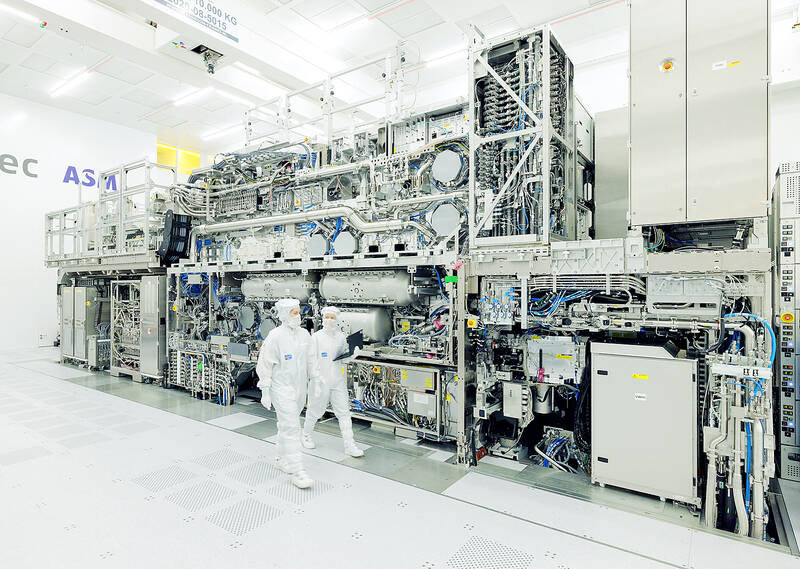ASML Holding NV and Taiwan Semiconductor Manufacturing Co (TSMC, 台積電) have ways to disable the world’s most sophisticated chipmaking machines in the event that China invades Taiwan, people familiar with the matter said.
Officials from the US government have privately expressed concerns to both their Dutch and Taiwanese counterparts about what happens if Chinese aggression escalates into an attack on the nation responsible for producing the vast majority of the world’s advanced semiconductors, two of the people said, speaking on condition of anonymity.
ASML reassured officials about its ability to remotely disable the machines when the Dutch government met with the company on the threat, two others said.

Photo: ASML / Michel de Heer via Reuters
The Netherlands has run simulations on a possible invasion to better assess the risks, they added.
Spokespeople for ASML, TSMC and the Dutch Ministry for Foreign Trade and Development Cooperation declined to comment. Spokespeople for the White House National Security Council, the US Department of Defense and the US Department of Commerce did not respond to e-mailed requests for comment.
The remote shut-off applies to Netherlands-based ASML’s line of extreme ultraviolet (EUV) machines, for which TSMC is its single biggest client. EUVs harness high-frequency light waves to print the smallest microchip transistors in existence — creating chips that have artificial intelligence uses as well as more sensitive military applications.
About the size of a city bus, an EUV requires regular servicing and updates. As part of that, ASML can remotely force a shut-off which would act as a kill switch, the people said.
The Veldhoven-based company is the world’s only manufacturer of the machines, which sell for more than 200 million euros (US$217 million) apiece.
ASML’s technology has long been subject to government interventions aimed at preventing it from falling into the wrong hands. The Netherlands prohibits the company from selling EUV machines to China, for instance, because of US fears they could lend its rival an edge in the global chip dispute.
The EUV machine has helped turn ASML into Europe’s most valuable technology stock with a market capitalization topping US$370 billion — more than double that of its client Intel Corp.
ASML has shipped more than 200 of the machines to clients outside China since they were first developed in 2016, with TSMC snatching up more of them than any other chipmaker.
EUVs require such frequent upkeep that without ASML’s spare parts they quickly stop working, the people said.
On-site maintenance of the EUVs poses a challenge because they are housed in clean rooms that require engineers to wear special suits to avoid contamination.
ASML offers certain customers joint service contracts where they do some of the routine maintenance themselves, allowing clients such as TSMC to access their own machines’ system. ASML says it cannot access its customers’ proprietary data.
TSMC chairman Mark Liu (劉德音) hinted in an interview with CNN in September last year that any invader of Taiwan would find his company’s chipmaking machines out of order.
“Nobody can control TSMC by force,” Liu said. “If there is a military invasion you will render TSMC factory non-operable.”

SEEKING CLARITY: Washington should not adopt measures that create uncertainties for ‘existing semiconductor investments,’ TSMC said referring to its US$165 billion in the US Taiwan Semiconductor Manufacturing Co (TSMC, 台積電) told the US that any future tariffs on Taiwanese semiconductors could reduce demand for chips and derail its pledge to increase its investment in Arizona. “New import restrictions could jeopardize current US leadership in the competitive technology industry and create uncertainties for many committed semiconductor capital projects in the US, including TSMC Arizona’s significant investment plan in Phoenix,” the chipmaker wrote in a letter to the US Department of Commerce. TSMC issued the warning in response to a solicitation for comments by the department on a possible tariff on semiconductor imports by US President Donald Trump’s

The government has launched a three-pronged strategy to attract local and international talent, aiming to position Taiwan as a new global hub following Nvidia Corp’s announcement that it has chosen Taipei as the site of its Taiwan headquarters. Nvidia cofounder and CEO Jensen Huang (黃仁勳) on Monday last week announced during his keynote speech at the Computex trade show in Taipei that the Nvidia Constellation, the company’s planned Taiwan headquarters, would be located in the Beitou-Shilin Technology Park (北投士林科技園區) in Taipei. Huang’s decision to establish a base in Taiwan is “primarily due to Taiwan’s talent pool and its strength in the semiconductor

Industrial production expanded 22.31 percent annually last month to 107.51, as increases in demand for high-performance computing (HPC) and artificial intelligence (AI) applications drove demand for locally-made chips and components. The manufacturing production index climbed 23.68 percent year-on-year to 108.37, marking the 14th consecutive month of increase, the Ministry of Economic Affairs said. In the first four months of this year, industrial and manufacturing production indices expanded 14.31 percent and 15.22 percent year-on-year, ministry data showed. The growth momentum is to extend into this month, with the manufacturing production index expected to rise between 11 percent and 15.1 percent annually, Department of Statistics

An earnings report from semiconductor giant and artificial intelligence (AI) bellwether Nvidia Corp takes center stage for Wall Street this week, as stocks hit a speed bump of worries over US federal deficits driving up Treasury yields. US equities pulled back last week after a torrid rally, as investors turned their attention to tax and spending legislation poised to swell the US government’s US$36 trillion in debt. Long-dated US Treasury yields rose amid the fiscal worries, with the 30-year yield topping 5 percent and hitting its highest level since late 2023. Stocks were dealt another blow on Friday when US President Donald